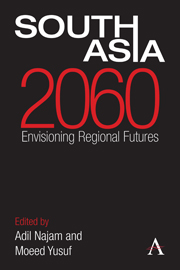Book contents
- Frontmatter
- Contents
- Acknowledgments
- List of Abbreviations
- Introduction: Imagining South Asian Futures
- Section I South Asia as a Region
- Section II State Relations
- Section III Development
- Section IV Human Well-Being
- Chapter 27 Population Dynamics, Economic Prospects and Regional Coherence
- Chapter 28 Towards Cooperation for Poverty Reduction?
- Chapter 29 Health Challenges
- Chapter 30 Regional Disease Dynamics
- Chapter 31 Education: Time Bomb or Silver Bullet?
- Chapter 32 Scholarship in and on South Asia
- Chapter 33 Rights and Justice: A Prospective View
- Chapter 34 Patriarchy, Power and Paradox: Dreaming Gender Equality and Development
- Chapter 35 Women in South Asia
- Chapter 36 Media: New Trends, Old Problems
- Chapter 37 Sports: Passion and Industry
- About the Authors
- Bibliography
- Index
Chapter 31 - Education: Time Bomb or Silver Bullet?
from Section IV - Human Well-Being
Published online by Cambridge University Press: 05 September 2013
- Frontmatter
- Contents
- Acknowledgments
- List of Abbreviations
- Introduction: Imagining South Asian Futures
- Section I South Asia as a Region
- Section II State Relations
- Section III Development
- Section IV Human Well-Being
- Chapter 27 Population Dynamics, Economic Prospects and Regional Coherence
- Chapter 28 Towards Cooperation for Poverty Reduction?
- Chapter 29 Health Challenges
- Chapter 30 Regional Disease Dynamics
- Chapter 31 Education: Time Bomb or Silver Bullet?
- Chapter 32 Scholarship in and on South Asia
- Chapter 33 Rights and Justice: A Prospective View
- Chapter 34 Patriarchy, Power and Paradox: Dreaming Gender Equality and Development
- Chapter 35 Women in South Asia
- Chapter 36 Media: New Trends, Old Problems
- Chapter 37 Sports: Passion and Industry
- About the Authors
- Bibliography
- Index
Summary
The future of a people is best predicted by the education of its youth. What South Asia looks like in 2060 will be determined by its ability to transform the educational profile of its people. A range of factors will influence what happens over the next 50 years, but education is a prerequisite for all of them. If there is one factor that could make the difference between catastrophic failure and breathtaking success, it is education.
The stakes are enormous. A poorly educated youth could despair at the lack of opportunity, sowing strife and violence. In contrast, the energy of a well-educated youth could make South Asia the cultural and economic dynamo of the world. This is a race against time: education versus the consequences of the lack thereof.
Because of the sheer numbers of young people entering adulthood today, South Asia will be both a potential flash point and an engine for the world. Half the population of India is under the age of 25. In Pakistan and Bangladesh, the median age is even lower. Compare this to China where the median is around 36. Each year that goes by without a quantum increase in educational opportunity for those under 25 means a new cohort of 30 million young people launching the next 50 years of their lives without the intellectual capital needed for success, if not survival.
- Type
- Chapter
- Information
- South Asia 2060Envisioning Regional Futures, pp. 246 - 253Publisher: Anthem PressPrint publication year: 2013

